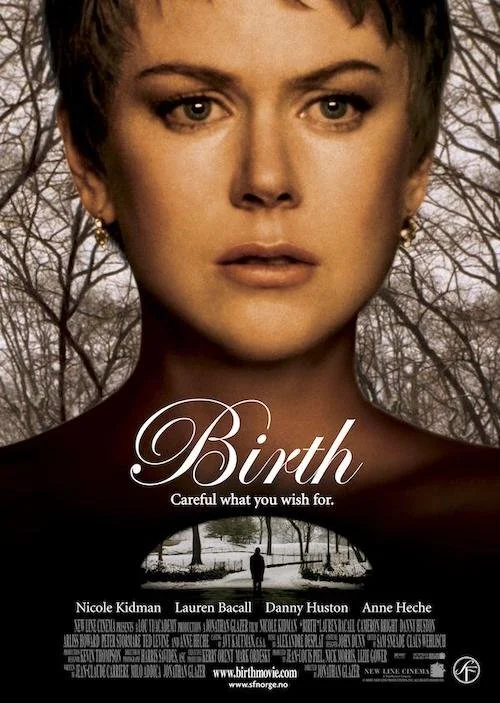Birth
WRITTEN BY OCTAVIO CARBAJAL GONZÁLEZ
Jonathan Glazer is quite a unique British filmmaker, recognized for his enigmatic and avant-garde approach to independent cinema. He began his career in the film industry as a music video director, working on videos for acclaimed artists such as Radiohead, Massive Attack, and Blur. Eventually, he transitioned to cinema and directed his first feature-length film Sexy Beast (2000), which received wide critical acclaim. Later in his career, Glazer would employ riskier and more experimental techniques, playing with narrative structures and using striking images to generate a deeply emotional and long-lasting effect on viewers. Through films like Under The Skin (2013) and The Zone of Interest (2023), Glazer explores universal themes such as identity, memory and human relationships, raising questions about existence and the human condition. Though Glazer's directorial output may be intermittent, his work manifest unseen forms both visually and narratively, and his massively underrated and deeply misunderstood film Birth (2004), serves as a quintessential example of this principle. Ostensibly straightforward in premise, the film could have easily taken myriad conventional routes, yet Glazer's distinctive approach diverges markedly from anticipated trajectories.
Birth opens with an unbroken tracking shot that follows a lone jogger through New York’s Central Park in winter. Against this image, we hear the jogger’s voice-over answering questions after a lecture. We can infer that the man has a skeptical mentality and doesn’t believe in the concept of reincarnation, as he explains: “If I lost my wife and the next day, a little bird landed on my windowsill, looked me right in the eye, and in plain English said, ‘Sean, it’s me, Anna. I’m back.’ What could I say? I guess I’d believe her. Or I’d want to. I’d be stuck with a bird. But other than that, no. I’m a man of science. I just don’t believe that mumbo-jumbo.”
Birth has sparked likenesses to Stanley Kubrick and Ingmar Bergman's films due to Glazer's chilly and introspective detachment portrayed in the characters and settings.
Resonating through us, an exquisitely crafted score by composer Alexandre Desplat accompanies the jogger, infusing the simple imagery with profound apprehension and introspection. Beneath a bridge along the path, the jogger decelerates in the darkness, and upon halting, his hands grasp his knees before collapsing lifeless. Immediately, the subsequent scene presents an unusual and captivating birth of a baby boy. As spectators, we ponder the potential connection between these two sequences, if any exists. Has the filmmaker hinted at the jogger's reincarnation, or are we merely predisposed to interpret apparently disparate events to afford ourselves a simpler comprehension of death and life?
A decade following the abrupt demise of her beloved husband Sean (Michael Desautels), Anna (Nicole Kidman) is prepared to move forward from her grief and embark on a fresh chapter. She has consented to marry Joseph (Danny Huston), a jovial and cultured man who has been by her side for three years. Anna's mother, Eleanor (Lauren Bacall), receives the news with joy. The apartment has been Anna's abode since Sean's passing and currently serves as the temporary dwelling for her pregnant sister Laura (Alison Elliot) and Laura's husband Bob (Arliss Howard). It is there that friends and relatives convene one evening to celebrate Anna and Joseph's engagement.
Unexpectedly and for the surprise of everyone, a belligerent and enigmatic 10-year-old boy named Sean (Cameron Bright) suddenly materializes at the festivity, asserting to be the reincarnation of Anna’s deceased husband. What starts as a silly joke and potential misunderstanding, swiftly evolves into astonishment and perplexity for the entire family, as the boy appears to know some of the couple's most insightful secrets, things that only the deceased Sean could know. Although Anna acknowledges the peculiarity of the situation, she finds herself increasingly drawn to the boy and is willing to defy the wishes of her fiancé and family to learn more about him. Is it conceivable that the boy is indeed Anna's husband, reborn? How can she reject the possibility of re-experiencing the intense love she once felt for him?
Glazer has envisioned and brought to life a poignant and delicate drama, an expertly executed film that resonates with its audience and stays with them like a lingering dream.
With deliberate scenes of simmering tension and enigmatic allure, the film immerses us in the crises of its characters. On one hand, a Joseph who ultimately succumbs to consuming jealousy and unusual anger incited by the boy, who pursues his fiancée. On the other hand, a bewildered Anna who unwittingly descends into her profound yearning for the seemingly impossible to become reality. While we never gain substantial insight into the Sean with whom Anna had a relationship, and although the child Sean possesses deep knowledge about adult Sean and their relationship, this doesn't conclusively imply he embodies the love that was shared, the specific tangible emotion that was cultivated over years of devotion. Anna's readiness to embrace this notion not only underscores the potency of "true love" to alter one's life and perspective but also suggests that it can stem from something as superficial as receiving the right answers at the opportune moment.
We aspire to believe that love emancipates us, enabling us to embrace every facet of our being and live with a broader spectrum of emotion and motivation. However, the film claims that love can manifest quite the opposite; it can be ominous, demanding, and compel individuals to act beyond good and evil. It’s also a poignant exploration of the powerful grip that grief can maintain over individuals unwilling to relinquish their deep-seated devotion or connection to those they have loved passionately. Ultimately, Birth is as unsettling as it is because it contends that while we may be creatures driven by instinct, we still crave love and its accompanying attributes, regardless of the potential and unexpected repercussions.
Octavio is a passionate cinema enthusiast from Mexico City, he mostly enjoys watching arthouse films from all over the globe. His reviews are published on "Vinyl Writers" (www.vinylwriters.com).








